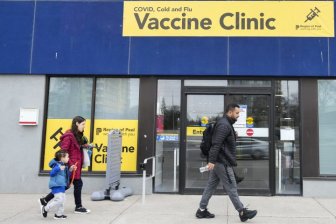CORRECTION: A previous version of this story had listed the wrong amount of doses of a COVID-19 vaccine that have been administered by the Middlesex-London Health Unit since the start of the pandemic. The story has been updated to reflect the proper amount of 1,231,783 doses.
As of Monday, adults 18 and older in London, Ont., are now eligible to receive a bivalent COVID-19 booster dose.
Local health officials are saying that this booster is more specific to the Omicron strains that have been circulating across the province.
“Since the end of last year, the original vaccine has been tremendously effective at keeping people out of hospital,” said Dr. Alex Summers, medical officer of health at the Middlesex London Health Unit (MLHU). “But with the new variants, the older vaccine just wasn’t as effective at preventing symptomatic illness and infection.”
Summers said the hope of the bivalent booster is that it will “provide additional protection,” which he said is an important factor as the region heads into the colder months.
The bivalent booster was first rolled out on Sept. 12 to those aged 70 and older, as well as residents of long-term care homes, retirement homes, elder care lodges and other congregate settings.
Summers, along with other health experts, said those interested in receiving the new additional dose should wait a minimum of three months before getting the vaccine, as the province is recommending people wait six months before getting this dose.
“The key thing for everyone to remember is that COVID is here to stay. It is not over, which means that we have to take some of those lessons that we’ve learned throughout the pandemic and apply them forever moving forward,” Summers said.
He added that currently, heading into the fall and winter, London is at “a new baseline of COVID activity.”
“As we head into the fall, we’re going to see COVID rates increase,” he said. “The reason for that is because people are going to be spending more time indoors in close contact with others.”
According to province-wide statistics, the number of people getting vaccinated seems to decrease with every booster made available, as about 86 per cent of people in Ontario have received at least one dose of a COVID-19 vaccine while roughly 51 per cent have received a third dose.
Summers said this raises concerns as Ontario is expected to head into a “rough” influenza season.
“Over the last few falls, we haven’t seen a lot of influenza because of all those public health measures which kept COVID at bay,” he said.
“The good news is that all the tools that you use to protect yourselves from COVID are still the tools you can use to protect yourself from flu.”
The news of the booster’s availability increase comes as Canada’s COVID-19 border restrictions are set to end on Sept. 30, alongside the mandatory use of the ArriveCAN app, according to the federal government.
As of Sept. 17, the MLHU said it has administered 1,231,783 doses of a COVID-19 vaccine since the start of the pandemic.
For more information about the bivalent COVID-19 booster or to book a vaccination appointment, visit the MLHU website.




Post a Comment